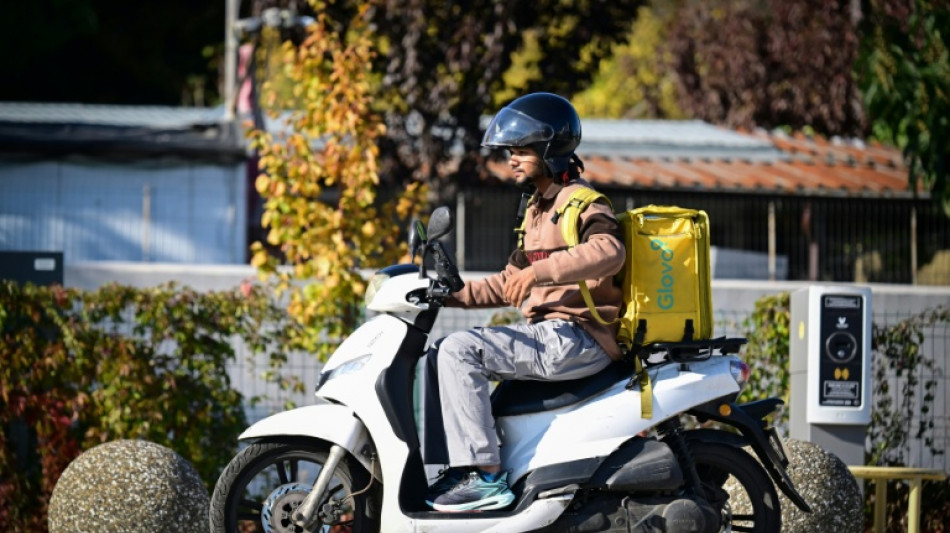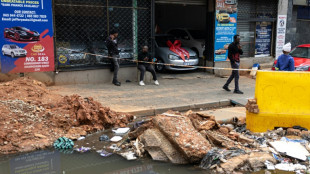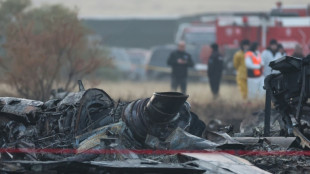

Migrant workers in Romania fear wave of hate fuelled by far right
Bangladeshi food delivery rider Sabbirrul Alam has stopped making night-time deliveries on his bike in Bucharest ever since a man hit a fellow countryman on the street, shouting "Go back to your country!" and "You are an invader!"
"I'm afraid," the 29-year-old told AFP, adding that the incident in August had surprised him.
"I think people have become very angry," said Alam, sporting a black cap with the Romanian flag.
The attack came just days after one of the leaders of the far-right AUR party, which has been gaining votes, asked people on Facebook to refuse deliveries from drivers who aren't Romanian.
Several European countries have seen an increase in attacks against immigrants in tandem with rising hate speech across the continent.
Concern is growing in Romania, which relies heavily on non-EU workers in its manufacturing, construction, trade and hospitality sectors.
Images posted to social media show that some delivery riders have even started writing "I am Romanian" on the bags they use to transport food.
President Nicusor Dan has condemned the August attack, describing it as an "act of xenophobic violence" which happened after the spread of "voices inciting hatred against foreigners".
"Words have real, sometimes dramatic consequences," he wrote on X.
- False claims -
The number of non-EU workers in Romania has steadily grown in recent years, reaching 140,000 at the end of 2024. Most are from Nepal, Sri Lanka, Turkey and India.
As Romanians leave the poor EU member state to work abroad, the Eastern European country has one of the highest labour shortages across the 27-nation bloc, according to a European Employment Services report.
Romulus Badea, president of the Employers' Federation of Labour Force Importers, says while attacks against foreign workers have been isolated, he hopes this won't "become a phenomenon".
Badea added he has noticed an increase in hate speech against foreign workers on social media, with false claims that "these people are coming to take our jobs".
In a deeply polarised society, a far-right candidate shot to prominence in presidential elections last year, which were later annulled.
Centrist Dan won a re-run in May, but anti-immigrant parties hold an unprecedented third of parliamentary seats.
In a Facebook post last week, AUR leader George Simion said foreign migrants were given better housing than Romanians in one Bucharest block -- a claim the owner reportedly dismissed, saying the renovated building was intended for all workers.
"Issues of concern are the increasing presence of hate speech in political discourse, in the media and online," the Council of Europe's anti-discrimination body, the European Commission against Racism and Intolerance (ECRI), said last month in a report on Romania.
In response to an AFP request asking if the number of incidents involving foreign workers had increased in recent months, national police said it did "not have the statistical data in the form you requested".
- 'Concerning' -
Several workers told AFP they had experienced degrading treatment.
Ruban Jayathas, a 47-year-old IT worker from Sri Lanka who has been living in Romania for more than 15 years, said he felt most Romanians remained welcoming but worried that online hate was "picking up momentum".
"I wouldn't have imagined it before," he told AFP.
In October, posters depicting a Nigerian man arrested for rape appeared in central Bucharest, urging people "to defend their city" before police took them down. No one claimed responsibility for putting them up.
In early November, in a town close to Bucharest, a Sri Lankan delivery rider was hit with a charging cable, cursed at and spat on following a traffic altercation.
He filed a complaint with the police, but later withdrew it.
After the case became public, a trade union announced it would offer free legal assistance and support in cases of abuse or harassment to all such workers.
"Unfortunately, this is not the first case of its kind, and these repeat offences are deeply concerning," it said.
A.L.Peter--BVZ




